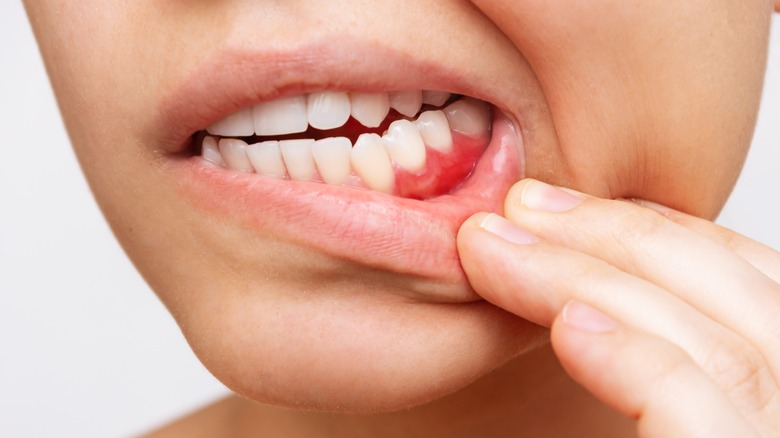The Serious Consequences Of Chronic Mouth Breathing
Breathing is a powerful process. Not only does it facilitate the circulation of fresh oxygen and nutrients throughout your body, but it's also connected to your central nervous system, which either alerts you to danger or helps you relax in stressful situations (via American Lung Association and Modern Family Dental Care).
But you probably don't spend much time thinking about breathing; as an involuntary biological process, it just happens, like your heart beating and digestion. You can control it, to certain extent — by holding your breath, for example. And you can also control the method by which you inhale and exhale: deeply or shallowly, into your belly or chest, or through your nose or mouth. But most people don't do this with any conscious thought. However, doing so could improve your health and well-being.
Breathing primarily through your mouth might be out of necessity. Perhaps it's because you have a cold, allergies, or some other condition that makes nasal breathing challenging. However, chronic mouth breathing can lead to a host of health complications, including dental problems, increased stress, asthma, allergies, poor sleep, and even abnormal growth in children. The good news is that in most cases, you can change the way you breathe through exercises and being mindful. Changing the way you breathe can really change your life, especially because chronic mouth breathing can have some serious consequences.
Poor oral health
Breathing primarily through your mouth can cause your oral cavity to dry out and reduce saliva production. Saliva plays an important role in oral health by maintaining pH balance and neutralizing acidity. It also reduces bacteria. Saliva helps flush out carbohydrates or sugars that are metabolized by bacteria and produce acids, via the National Institutes of Health (NIH). Acidity and low pH can lead to a host of negative effects on oral health, including tooth decay and periodontal disease, which is inflammation of the gums and bone that support the teeth (via NIH). Breathing primarily through the mouth can also lead to erosion of dental surfaces and increased tooth sensitivity to temperatures.
Bad breath is another risk of mouth breathing. A proliferation of bacteria coats the tongue, teeth, and gums, and without the cleansing effects of pH-balanced saliva, the bacteria decays and creates a bad taste in your mouth, as well as a foul-smelling odor (via NHS inform).
Mouth breathing can also lead to bruxism, a condition which causes you to clench or grind your teeth. Bruxism can wear down teeth surfaces and cause chips and cracks, tenseness and pain in the jaw and face, sensitive teeth, headaches, and more (via Johns Hopkins Medicine).
Chronic fatigue
If you feel like you're dragging from morning til night and have trouble mustering the energy to accomplish your daily activities, it could be the way you breathe.
Of course, chronic fatigue can be caused by a host of physical and mental conditions, which you should definitely rule out in a visit with your doctor. But if you tend to primarily breathe through your mouth, your organs and tissues may not be getting the oxygen they need to function (via BDJ Team). Even your brain needs oxygen to function properly, which is why chronic fatigue is not only characterized by physical fatigue, but also by brain fog and trouble concentrating (via the Centers for Disease Control and Prevention).
According to a clinical review in Nursing in General Practice, nasal breathing results in 10 to 20% more oxygen intake compared to mouth breathing. Nasal breathing also facilitates the release of nitric oxide, a gas that helps raise blood levels of carbon dioxide and improve blood oxygenation (via the BMJ). Mouth breathing doesn't produce nitric oxide nearly as effectively, which is why mouth breathers may not get enough circulating throughout their bodies and, as a result, feel more fatigued on a regular basis.
Sleep problems
You would be surprised just how much breathing through your mouth instead of your nose while you sleep can affect your health. As reported by CNN, scientists from Stanford experimented on James Nestor, author of the book, "Breath: The New Science of a Lost Art," blocking his nostrils with silicone and surgical tape for 10 days while he snoozed. In that short period of time, Nestor's blood pressure shot up 13 points, putting him in stage 1 hypertension. His heart rate variability, a measure of the amount of time between heartbeats, indicated his body was in a stressful state, and his heart rate increased. He snored and developed obstructive sleep apnea, a condition which causes episodic partial or complete collapse of the airway, reduced blood oxygen levels, and frequent waking during the night. During the day, Nestor "stumbled around in a mental fog."
You might be a nighttime mouth-breather if you wake up with a dry mouth or feel fatigued after waking. You might also find that you wake up with the need to urinate more frequently during the night. As sleep medicine specialist Dr. Steven Park told CNN, disordered breathing can put stress on the heart, and can lead to increased production of hormones that cause your body to produce more urine.
There are many reasons people breathe through their nose at night, the most common being blocked nasal passages from illness, allergies, a deviated septum, or medications. Unfortunately, lying down can make congestion worse.
Abnormal facial growth in children
In children, mouth breathing can have long-term, irreversible consequences. Over time, mouth breathing can cause muscular and postural changes that can lead to dentoskeletal aberrations. Often referred to as "long-face syndrome," these dentoskeletal changes lead to greater lower facial height, an open mouth posture, and nostril narrowing (via NIH). It can also cause narrowing of the lower face and mouth, a gummy smile, and misaligned teeth.
Like adults, children with mouth-breathing syndrome do not get quality sleep at night, which can impact many areas of their physical and mental health and well-being. Lack of sleep can affect physical growth and development, as well as academic performance. According to an article in General Dentistry, many children with mouth-breathing syndrome are often wrongly diagnosed with hyperactivity and attention deficit disorder (ADD). Children should be screened for mouth-breathing as early as 5 years old, as detection can prevent or lessen its negative effects on growth and social and academic performance.
Reduced exercise performance
During exercise, your cardiorespiratory system circulates fresh, oxygenated blood to all your muscles so you can keep running, jumping, skiing, or swimming. If you're not getting enough oxygen, then you're going to get tired much more quickly and your performance will suffer.
When you're huffing and puffing on a run, it might seem easier to take in big gasps of air through your mouth to get as much oxygen as possible; however, it's not the most efficient method. Breathing through your nose can help you take in up to 20% more oxygen compared to mouth-breathing. Nasal breathing also facilitates the production of nitric oxide, which improves blood oxygenation.
According to a review published in the Journal of Sports Research in 2020, breathing only through the nose during exercise helps lessen "exercise induced bronchoconstriction, improved ventilatory efficiency, and lower physiological economy." If you've ever tried exclusively nasal breathing during your workout, it may seem impossible. But the authors of the review state that most people can achieve it at moderate activity levels, and even during heavy and maximal aerobic activity levels as they become more conditioned.
Higher stress levels
Slow, deep breathing activates the parasympathetic nervous system, the part of your central nervous system that helps promote relaxation and reduce stress (via Henry Ford Health). When you breathe through your mouth, you're more likely to breathe quickly and shallowly, into your chest instead of your belly. This stimulates the sympathetic nervous system, which is responsible for activating your "flight or flight" response in stressful or dangerous situations (via Ecologic Dentistry).
Why does this matter? In the moment, practicing deep nostril breathing can reduce immediate feelings of stress. In the long-term, reducing stress can improve your overall physical and mental health. Chronic stress can increase your risk of depression, anxiety, digestion problems, sleep issues, weight gain, cognitive impairment, heart disease, high blood pressure, heart attack and stroke (via the Mayo Clinic).
The next time you're feeling overwhelmed with work, responsibilities, and life in general, try taking a few deep inhales and exhales through your nose, and notice the effects.
Asthma
When you have asthma, inflammation and tightness around the airways in your lungs causes them to narrow (via the World Health Organization). This makes it harder to breathe, and causes you to cough, wheeze and experience tightness in your chest. Symptoms tend to be worse in the evening or when you exercise. Asthma can also be triggered by viral infections, smoke and fumes, pollen, pet dander, and strong odors from soaps and shampoos.
Breathing through your mouth can make asthma worse. Your nose serves a protective purpose, filtering the air you breathe and catching potential irritants before they can make their way to your lungs. This is facilitated by tiny hairs called cilia that line the mucous membranes of the nose. Breathing through your mouth bypasses this built-in air purifier and creates a direct pathway for irritants to your lungs, which can trigger an asthma attack.
Additionally, mouth breathing contributes to allergic rhinitis, a condition that affects one-sixth of the population and results in nasal congestion, post-nasal drip, and sneezing, among other symptoms (via NIH). According to an article in Allergy, Asthma & Clinical Immunology, people with allergic rhinitis are three times more likely develop asthma.
Asthma is a treatable condition, but it can also be deadly. According to the Asthma and Allergy Foundation of America, asthma kills an average of 10 people in the U.S. each day. Per a study in Asthma, mouth breathing potentially increases asthma-related mortality due to a greater sensitivity to inhaled allergens.
How to stop mouth breathing
Making the change to primarily nostril breathing is two-fold. First, you have to medically address blocked nasal passages. If you're sick and stuffed up, blockage is temporary and should resolve within days to weeks. If you have chronic allergies, medications can help relieve your symptoms and clear your nasal passages. Conditions such as a deviated septum are more complex to fix, but not impossible. Medications such as decongestants, antihistamines and nasal sprays can help (via HealthDirect). If they don't, surgical processes are also a solution. If you're having long-term difficulty breathing through your nose, talk to your doctor about treatments. As you now know, being able to breathe through your nose can have far-reaching effects on your health and well-being.
If you tend to mouth breathe only at night, you can take some steps before bed to increase your chances of getting a good night's sleep through nasal breathing. Avoid eating close to bedtime. Doing so can allow stomach juices to creep up into your nasal passages and sinuses, increasing congestion (via CNN). You can also flush the nose with a saline solution, using a neti pot or squeeze bottle before hitting the sack. The salt in the solution can help draw out water and reduce congestion.
You can also try mouth-taping, an increasingly popular method for stopping nighttime mouth breathing. Special products made for this purpose don't block airflow through the mouth, but rather train your jaw to stay closed during the night.
Mindfulness and breathing practices
If a medical condition is not prohibitive, stopping mouth-breathing may take simple conscious action to change your habit. Mindfulness is a technique that can help you stay more alert to your breath in the moment. When you catch yourself mouth-breathing, stop and take a few deep inhales and exhales through your nose. After a while, you won't have to focus on it so much, and it will just happen naturally.
In addition to staying mindful, doing daily breathing exercises can help. These can serve the dual purpose of improving nasal breathing and helping you relax. A nasal breathing exercise can be as simple as sitting quietly and practicing taking slow, deep breaths through your nose and into your belly. Try to do this for five to 10 minutes each day.
Alternate nostril breathing is a bit more complex. It's a form of a pranayama, or yogic breath exercise, that has been used for centuries in yoga and meditation practices. It requires deep focus, which can help further reinforce nasal breathing as a habit. One study found that yogic breathing practices such as alternate nostril breathing improved lung function in a group of swimmers. To do it, sit in a comfortable position. Bring your right thumb to your right nostril and gently close it off. Inhale slowly through your left nostril, then use your left index or middle finger to close off your left nostril. Release your right nostril and exhale slowly. Repeat for several rounds.










